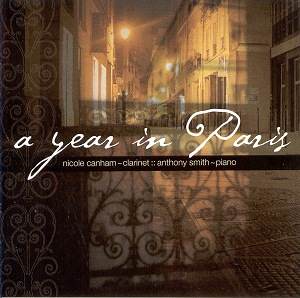Nicole Canham is
the arranger I commended in her role
as clarinetist in the quartet Clarity.
That foursome has a light-hearted but
not frivolous approach to the repertoire.
Here, with adroit pianist Anthony Smith,
Canham shows her mettle on the clarinet,
her first study. She studied in Paris
so it’s fitting that she should essay
this Francophile-oriented disc. In the
main it abjures the comfortable and
the familiar.
That
said we begin with the Poulenc, a work that clarinettists have
hardly avoided. I’m not sure what Professor Cuper told her
about it at the Versailles Conservatoire but this is an unusually
relaxed reading. It makes a striking contrast to the Nash Ensemble,
say, whose Richard Horsford and Ian Brown, are altogether snappier,
quixotic and much faster. The question of tempo is relevant
inasmuch as it changes the character of the piece. In Canham
and Smith’s hands it’s a more becalmed, introverted and rather
overtly romanticised piece ... and not just in the Romanza.
If you prefer your Poulenc driven at speed and mercurial you
may find this performance a mite too relaxed.
The
Anglo-Australian - technically, chronologically that should
be the other way around – he holds dual nationality - John
Carmichael studied with fellow Australian Arthur Benjamin as
well as Anthony Milner. He also studied in Paris with that
superb pianist Marcel Ciampi. The 2002 Pastorale was written
for another Anglo-Australian, Malcolm Williamson. As with almost
everything I’ve heard of Carmichael’s music – he has written
a delectable Trumpet Concerto as well as a lot of chamber and
instrumental music – this tiny Pastorale is broadly traditional
and has Finzi longings; and is a treat. It’s appropriate to
follow the pupil with his Master, Benjamin. The Tombeau exists
in versions for viola and also clarinet. It’s an elegantly
sinuous opus and an apt tribute to Ravel written two years
before Benjamin’s death. Written in the form of valse-caprices
and multi-sectional they combine plangent lyricism with quirky
rhythmic games in the finale – and excellent opportunities
for registral changes.
Cahuzac
was one of the great clarinettists, a lion of the French School
and his two mood pieces reflect total immersion in technical
matters, timbral niceties and breath control. Especially seductive
is the languorous fantasia evoked in his Pastorale Cévenole. Another
link brings us to Debussy’s Les pas sur la neige as
Cahuzac famously premiered Debussy’s Première Rhapsody with
the composer at the piano. And Françaix’s Tema con variazioni
shows what a demanding conservatoire test-piece can sound like
though, also, how seductive it can be made to sound when romantic
subtlety, velvet warmth and Pigalle frolics are written into
it. The cadenza is appropriately freewheeling. Finally we have
two non-French pieces. Brumby’s Danza is all too short – but
very aerial and jolly – and Stanhope’s Phospheric Variations,
written over a Purcellian ground bass, is a pleasurable opportunity
for some bracing colour.
The
attractive recording quality is complemented by notes and a
repertoire that may well appeal. Let’s see what Canham can
do with Finzi next.
Jonathan
Woolf


